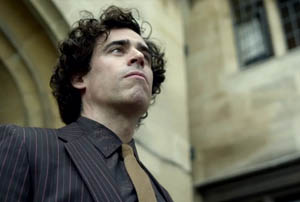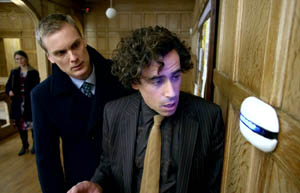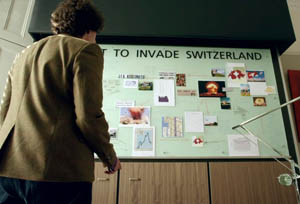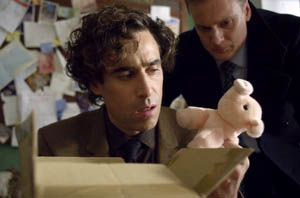|
Can I say a few words about Mr. Douglas Adams, my favorite author and all-around clever person that he was? Some readers might appreciate some context for this review. If not, you may wish to skip ahead to the end, which is a good bit and has Marvin in it. 
Adams was a genius, and I don't bandy that word about lightly, as too often happens in these situations. He had a brilliant way of writing that could make any subject seem funny simply by means of his deft use of sentence structure and rambling, yet hilariously spot-on metaphors. He had a real talant for satire as well, making his point clearly and wickedly without ever appearing mean or spiteful. His Hitch-hikers' Guide "trilogy" (which ultimately grew to include five books, but was a mere four when first I learned of it) was a revelation when I discovered it at the age of sixteen, by far the funniest thing I'd ever encountered in print. The funniest thing I'd ever encountered period was probably the rabbit scene in Monty Python and the Holy Grail, with which it shared a similar absurdist style. Revisiting the books in my twenties, I then caught all of the political and social satire that had flown by me unnoticed in my teen years, and I laughed all over again. So it seems surprising to me, in retrospect, that after acquiring his then-newest novel Dirk Gently's Holistic Detective Agency in 1987, I let it sit for months before taking the plunge. Change is, as far as I'm usually concerned, typically for the worse, and not only was this new book unrelated to Hitch-hikers', it was not, according to the contemporary reviews, strictly comedic. But eventually I got around to reading it, and it immediately became my favorite book ever, a spot it has retained to this day. I didn't even really understand about a third of it, but that was totally by-the-by. It was a work of sheer brilliance. Some one, I was convinced, should make a movie of it-not, to paraphrase JFK, because it would be easy, but because it would be hard, and therefore utterly worth trying. If ever I'd had a budget to produce a real feature, as opposed to the three-minute bits of crap we actually have produced, it would've been a shoo-in for my first pick. 
Over two decades later, no one has yet attempted a feature film, but in 2010 the BBC produced a pilot for a new TV series, which finally saw fruition in 2012 in the form of three more episodes (hardly a full season by US standards, but not terribly unusual in the UK). I'll quickly cut to the chase-the series is funny and entertaining, and owes much to the two-and-a-half extant Dirk Gently novels, but it is not a direct adaptation of any of them. Leaning away from any Kennedy-esque challenges, the writers have cleaved more closely to the Hercules from Saturday Night Live, who averred, "This rock is too large. I will lift a smaller one." What we have is an extrapolation of various plot points and themes, some originally little more than bits of backstory, stirred together to create new plots in the Adams style. The pilot episode clings most closely to the source material, with characters and concepts from the first novel on display in great numbers, if somewhat repurposed into a slimmer, more streamlined narrative. The remaining three episodes move further still from the books in terms of specific events, though they manage to retain a sense of kinship with the published stories (a bottle of wine bearing the label "Abyssinian Maid" in particular made me laugh). It's only fair, I suppose, to expect such an approach; in a serial format, one can't really expect to see Dirk solve the mysteries of the universe or save the human race from extinction on a regular basis. Even Adams himself never figured out quite what to do with the character after the second book, though having the audacity to actually up and die in the middle of the long-delayed third novel was in rather poor taste. Perpetually and infamously missing deadlines is one thing, but this sort of behavior is simply pushing the joke too far. 
For those who don't know, Dirk is a private detective who "does not like excluding the impossible," and follows a method involving quantum interconnectedness which on the surface feels totally random, or rather frequently like some sort of scam: vacations to the Carribbean in the alleged purpose of finding pets lost in London are simply part of his method, which works more often than it possibly could in a more serious world. One is never quite sure what to feel about Dirk; even after numerous successes, his flagrantly self-serving behavior paints his every act and decision as a likely con job. Promoted from the status of client to partner (or assistant, depending on who you ask) after the first episode, old school mate Richard MacDuff has moved into the role of Dr. Watson, the straight man who is always behind the curve and perpetually torn between the fascinating though maddening maybe-genius and his desire for a more settled life. Those drawn in by the superficial resemblance to the BBCs hit Sherlock series, however, shouldn't expect the actual mysteries to be part of the same storytelling tradition, i.e. actually conforming to logic or rational possibility. Adams got his start writing science fiction, and despite Dirk's more grounded setting, his plots tend to veer into SF territory, or at the very least into the realm of computers and technology, more often than not. 
Given the amount of time I've spent wishing I could adapt this property myself, it's not surprising to find that this version doesn't quite match the one in my head. Dirk, as played by Stephen Mangan, is much more manic, his silly hat and roundish figure replaced by a still off-kilter but more attractive image. His portrayal walks a fine line-and sometimes crosses it-between an amusing asshole and and actual asshole. Darren Boyd's Richard MacDuff, aiming for a sense of balance, swings too far in the opposite direction and comes off as rather stiff and joyless (and bearing next to no similarly to the book character). Certain concepts from the novel suffer strange alterations in their adaptation to the screen-what are we make of it when Dirk claims to have been present when Erwin Schrödinger himself was actually performing his famous thought experiment with the cat? That Dirk is 100 years old, and Schrödinger was nuts? But the most dramatic difference is in the tone, wherein the bizarre mysteries are used as structures upon which to hang jokes and frentic goings-on, the actual plots seeming almost incidental to the hijinks they inspire. Shot through and through with Adams' witty prose, the books nevertheless presented the ineffable events as serious business, infused with a palpably spooky air that gave them an almost Lynchian feel, with beguiling fragments of narrative crying out for some illuminating context which, if you were lucky enough to be reading either of the two novels he actually finished, would refreshingly arrive at the end. The lyrics are the same, as it were, but the creepy, foreboding score has been dropped. But the fun of the world Adams created remains, and I was looking forward to a time when, if there was any justice in the world, the writers might conceivably take on the not-inconsiderable task of creating an ending to the lamentably unfinished third novel, The Salmon of Doubt. So naturally, the BBC cancelled it. The character of professor Chronotis (who never appeared in the series, but was a key character in the first novel) was originally conceived as a character in the Adams-penned Shada, a Doctor Who serial that was never finished or broadcast in any part due to a writers' strike. The Salmon of Doubt was left half-finished due to Adams' own legendary procrastination, and now Dirk Gently the series has been dropped for purely monetary reasons; it's enough to make the supremely gullible believe the property is perhaps suffering from some malign curse. I'm reminded of another of Adams' creations, Marvin the manically depressed robot, who makes a final journey to a far distant planet in order to see God's final message to the universe, which ultimately reads "We apologise for the inconvenience." For those of us who loved and miss Douglas Adams and his works, it's a more fitting epitaph than it should have been. -review by Matt Murray
|
|
||||||||